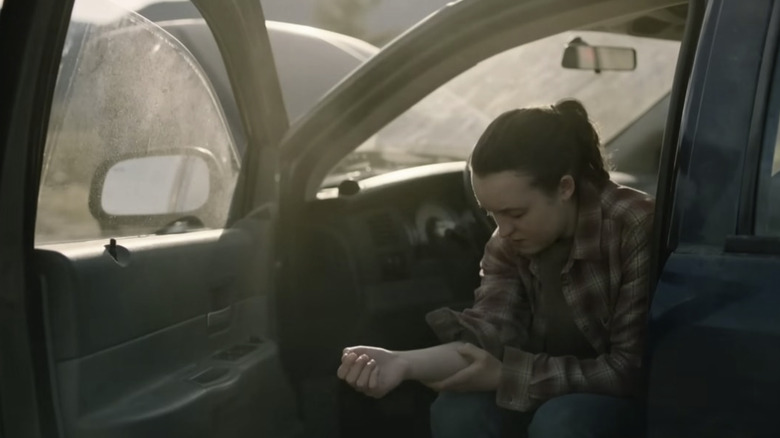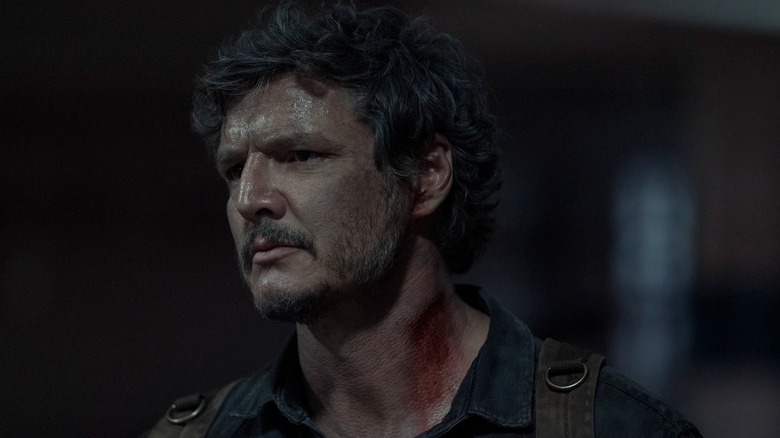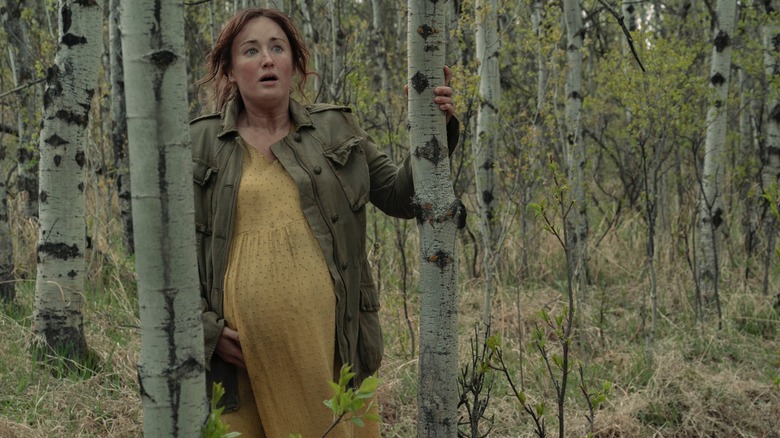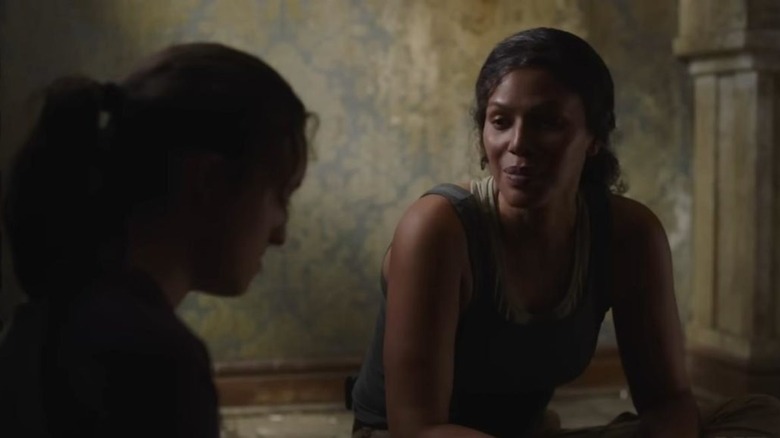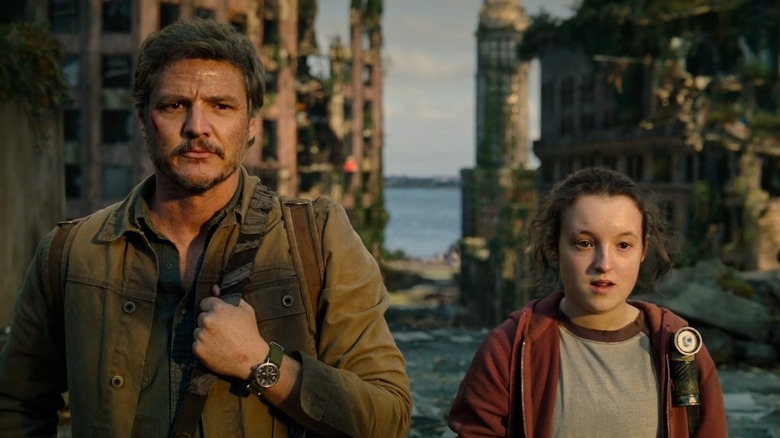HBO's The Last Of Us Overcorrects The Original Ending's Moral Ambiguity
This post contains major spoilers for the season finale of "The Last of Us."
The ending of the original "The Last of Us" game is what instantly solidified it as one of my favorite stories ever told. As it was, the narrative was already an exemplary pastiche of the zombie genre, prioritizing the innate human drama of surviving in a decaying world over clichés and senseless violence. Of course, it can be a downer at times, but as we've seen through the tales that intersect Joel (Pedro Pascal) and Ellie's (Bella Ramsey) adventure through the post-apocalyptic United States, the series is also capable of depicting genuine joy, catharsis, unrelenting trauma, and the visceral weight of love and connection.
Joel and Ellie, the duo who were once player-characters and who are now TV protagonists, are our window into this dystopia. Sure, it's been done before — the surrogate father/daughter relationship between a man haunted by loss and a girl who's never known belonging — but the last act of "The Last of Us" is what elevates it into something genuinely new. After playing through Joel's murderous rampage through the Salt Lake City hospital, our "hero" makes a choice to save one life, Ellie's life, over the fate of humankind. Not only that, but he unashamedly lies to her about what he's done to protect her.
In the game's final moments, it is no longer a heartwarming tale of a found family in a cruel world. It becomes a story about love and vengeance; about the complexities of the human condition. On paper, the series finale of the HBO adaptation follows the same beats, so why does it feel significantly less nuanced?
In fear of misinterpretation, showrunners Craig Mazin and Neil Druckmann have sanded off the morally ambiguous edges of the source material's ending.
The Last of Us has been victim to internet backlash
There's no right way to view the ending of "The Last of Us." To some of us, Joel's actions are going to read as unjustifiably cruel, and his assertion over Ellie's agency as selfish. To others, especially those who are parents themselves, it's easy to empathize with his decision to choose his family first. There are no easy answers, and that's what gives this story sophistication — but there are times when fans have unfortunately simplified Neil Druckmann's writing into harmful black-and-white boxes.
Despite glowing reviews and successful sales, the second game in the series, "The Last of Us Part II," was initially met with a harsh internet backlash. Some of it was partially manufactured outrage from toxic, bigoted communities that we're not going to dignify. But — without spoiling the details for potential readers, since the sequel's premise is so inextricably tied to Joel's choice at the Firefly hospital — there existed a vocal minority of gamers that outright refused to engage with "Part II" from the get-go and were determined to see the game fail up until its release.
This close-mindedness was not trivial —it was vicious. A leaker spread out-of-context spoilers and clips on social media to sway passionate fans to not play the game. Druckmann, Naughty Dog staff, as well as lead performers like Laura Bailey, ended up as targets of internet harassment.
Ironically, the sequel would poetically explore the ugliness of blind hatred that these "fans" exhibited. Druckmann followed up his masterpiece with a challenging, ambitious piece of art that added even more layers of complexity to the original. Thankfully, no amount of death threats or hate speech could ruin that achievement.
The HBO series recontextualizes the story
With the HBO series, Neil Druckmann had an opportunity to revisit Joel and Ellie's first adventure with the foresight of where these characters end up in "Part II." While most of these tweaks and additions have made the story feel more cohesive, like the added religious themes with David and his cult or the glimpses of Ellie's crude fascination with violence (or some that are just good fun, like Dina making an early appearance in Jackson) — I strongly feel this finale episode largely suffers from planting the seeds of the second season.
It was hard to put my finger on at first. Thankfully, there are no tacky, explicit references to characters that become pivotal to the sequel, no new cliffhangers or loose threads, and the beats of the episode are essentially the same as the game's final act. But every now and then, there was a subtle change with broader implications. Instead of a vaccine, Marlene (Merle Dandridge, who is reprising her original role in live-action) explains Ellie's disposition to the Cordyceps could reverse-engineer a cure. We also get an explanation of her immunity via a flashback to Ellie's mother, Anna (Ashley Johnson, the original voice of Ellie). During Marlene's final confrontation with Joel in the parking structure, there's an added piece of dialogue that lacked the subtlety of the original scene. Marlene questions, "How long until she's torn apart by infected, or murdered by raiders, because she lives in a broken world that you could have saved?"
We were able to read between the lines and how that reflects on Joel's decision before, but here, it feels there is little room for the imagination. Mazin and Druckmann want to make it clear, Joel could have changed the world for the better.
Don't feed the trolls
Obviously, Marlene is an unreliable narrator. She's an extremely principled character, but her willingness to sacrifice Ellie despite her commitment to Anna is a distinct foil to Joel's own bond with Ellie. Her decision to take Ellie to surgery while she is unconscious is as much a violation of the young girl's agency as Joel's own choices, but these new additions feel like they add to her credibility and emphasize Joel's short-sightedness. A cure has totally different implications than a vaccine. She may be cold, but she's also ideologically consistent and wise. It feels less like a situation of equal fault.
I don't blame Craig Mazin and Neil Druckmann for attempting to add more stakes to Joel's choice, especially seeing how often Joel is uncritically put on a pedestal as a hero by fans of the original game. There are times when Joel's darker side is perfectly portrayed within the finale, such as the new montage sequence of his murder spree to find the operating room, or his gleeful obliviousness as he walks Ellie back to Jackson.
But I still find myself bothered by these small narrative tweaks and the way they are lampshaded throughout the episode. It indicates a lack of restraint that the original game's ending had in multitudes. The direction of the season finale feels like a response to the toxicity Druckmann experienced, as though there was a distrust of the audience's good faith to engage with the story. Perhaps it's justified, but I think it makes for a weaker piece of art. Don't feed the trolls.
Mazin and Druckmann have made a retroactive judgement on Joel
Instead of embracing the moral ambiguity of "The Last of Us" with confidence, it feels as though Craig Mazin and Neil Druckmann have retroactively made judgments on Joel's choices. Even if unintentional, they pushed the scales a little too far in one direction for my taste.
The original ending is brilliant because it asks us to hold multiple truths at once. Joel's love for Ellie is special and a redemptive force within him, but it also gives him the capacity to hurt and act selfishly in the name of fatherhood. Marlene and the Fireflies had a noble mission to save what's left of society, but they also were willing to cross a hard moral line to get there. Ellie is safe and loved with Joel, but we know she would give her life for the greater good in a heartbeat. What Joel does is inhumane, and yet, so achingly human.
As "The Last of Us" enters its second season, which is bound to cover much more emotionally complex territory, I only hope that Mazin and Druckmann don't forget that the difference between right and wrong is simply a matter of perspective.
